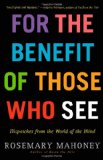Summary | Excerpt | Reviews | Beyond the Book | Read-Alikes | Genres & Themes | Author Bio

Dispatches from the World of the Blind
by Rosemary MahoneyThis article relates to For the Benefit of Those Who See
In her nonfiction book For the Benefit of Those Who See, Rosemary Mahoney recounts her experiences at Braille Without Borders, an international development organization that helps blind and partially sighted students gain independence, workplace skills, and professional training.
Founded in Lhasa, Tibet, the organization is the brainchild of Sabriye Tenberken. A German native, Tenberken was born with a degenerative disease of the retina and by age 12 was completely blind. Mahoney's book recalls some of Tenberken's experiences growing up. She felt patronized by her teachers and, by contrast, was ostracized and bullied by her classmates. For years she denied her blindness and even tried to hide it. "Not until I accepted my blindness," Tenberken told Mahoney, "did I begin to live."
 Tenberken was educated at a boarding school for the blind, where she learned self-reliance. She later attended the University of Bonn and majored in Central Asian studies with a focus on Tibet. Despite the discouragement from professors who tried to dissuade her from studying the difficult Tibetan language, she persevered and eventually helped devise a software system that enabled her to transcribe entire Tibetan texts into formally printed Braille.
Tenberken was educated at a boarding school for the blind, where she learned self-reliance. She later attended the University of Bonn and majored in Central Asian studies with a focus on Tibet. Despite the discouragement from professors who tried to dissuade her from studying the difficult Tibetan language, she persevered and eventually helped devise a software system that enabled her to transcribe entire Tibetan texts into formally printed Braille.
When she traveled to Tibet in 1997, she learned that more than 30,000 of the country's 2.6 million people (over 1%) were blind, about twice the global rate. Poor diet and unhygienic conditions are factors, but the main cause is the country's elevation. The sun's ultraviolet rays are intense at such high altitudes and cause damage to the unprotected eye. Realizing that blind people in Tibet could benefit from her system, she decided to start a school there.
With twenty thousand dollars of her own money, Tenberken, along with her sighted Dutch partner, Paul Kronenberg, an engineer, founded their project in 1998, and named it Braille Without Borders in 2002. Charging no tuition or boarding fees, they set up a school and started with six students. Tenberken and Kronenberg continued to apply for grants and raised funds from private sources. In following years, the staff grew and more students arrived.
An extension of Braille Without Borders in India, kanthari, offers a leadership program for people who have overcome adversity and strive to create ethical social change. Some kanthari participants are blind or physically disabled while others have no disabilities. Since 2009 more than 40 social initiatives have been set up by participants world-wide.
In 2004 a film team joined Tenberken, six blind students from the Braille Without Borders project, and world-class blind mountain climber Erik Weihenmayer as they attempted to climb Lhakpa Ri, the 23,000-foot peak next to Mount Everest. The results of their three-week journey can be seen in the documentary "Blindsight."
Picture of Sabriye Tenberken and Paul Kronenberg from Braille Without Borders
Filed under Society and Politics
![]() This "beyond the book article" relates to For the Benefit of Those Who See. It originally ran in March 2014 and has been updated for the
March 2015 paperback edition.
Go to magazine.
This "beyond the book article" relates to For the Benefit of Those Who See. It originally ran in March 2014 and has been updated for the
March 2015 paperback edition.
Go to magazine.
Your guide toexceptional books
BookBrowse seeks out and recommends the best in contemporary fiction and nonfiction—books that not only engage and entertain but also deepen our understanding of ourselves and the world around us.